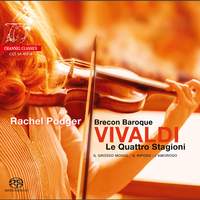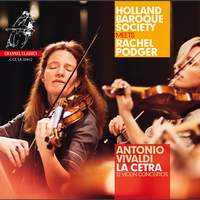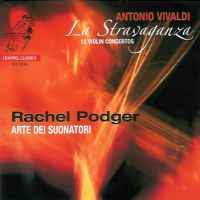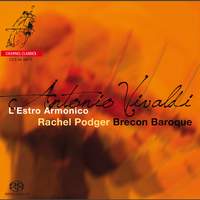Interview,
Rachel Podger on The Four Seasons
 British baroque violinist Rachel Podger has serious form when it comes to Vivaldi: her 2015 recording of L’Estro Armonico won the Concerto Category at the following year’s BBC Music Magazine Awards as well as being shortlisted for a Gramophone Award, and her account of La stravaganza was a Building A Library First Choice last year. This year she’s celebrated a significant birthday by tackling the ‘Red Priest’’s most famous concertos with her chamber ensemble Brecon Baroque (founded in 2007), in interpretations which are being feted for their ‘freedom and buoyancy’ (Financial Times), ‘serene virtuosity’ (Gramophone), and ‘myriad subtleties’ (The Times).
British baroque violinist Rachel Podger has serious form when it comes to Vivaldi: her 2015 recording of L’Estro Armonico won the Concerto Category at the following year’s BBC Music Magazine Awards as well as being shortlisted for a Gramophone Award, and her account of La stravaganza was a Building A Library First Choice last year. This year she’s celebrated a significant birthday by tackling the ‘Red Priest’’s most famous concertos with her chamber ensemble Brecon Baroque (founded in 2007), in interpretations which are being feted for their ‘freedom and buoyancy’ (Financial Times), ‘serene virtuosity’ (Gramophone), and ‘myriad subtleties’ (The Times).
I spoke to Rachel last week about her earliest encounter with these concertos, the challenges involved in shedding fresh light on such familiar works, and the pleasures of approaching The Seasons as chamber-music.
You’ve recorded a lot of Vivaldi already: did you consciously ‘keep back’ The Seasons until now?
It was partly circumstantial, but there was a long-term plan involved too – I was keen to do some of the lesser-known concertos first (hence La stravaganza and La cetra), and it was such a voyage of discovery for me. I’d heard and played a couple before we started the projects, but to actually immerse yourself in the whole set over months of performing and recording was very special. I find that there’s such inventiveness in those concertos, and it makes you appreciate something as well-known as The Seasons in a completely different way: it’s so interesting to compare certain figurations and ideas and to think ‘Hang on, I’ve come across that before..!’.
But The Seasons really does live up to its popularity: it’s so strikingly different, not just in its construction but in the way Vivaldi uses his language and figuration and phrase-lengths to show what he wants. The visual aspects of nature (and human suffering, and joy, and dance) are all very clear – if the accompanying poems weren’t there I think it would still actually be quite easy to see what it's all about.
Vivaldi contributed so much to the evolution of the solo concerto, particular for violin – how radical do you find his writing in The Seasons?
Very! Take the opening of Spring: the ritornello adheres to his usual format and language, but then there’s this incredible canon of birdsong! To write that without a bass-line (and without any bar-lines, really) is incredibly modern, almost avant-garde. I think our experience of this music is slightly coloured by hearing it everywhere - but when you compare it with other Vivaldi concertos which have more of a continuous narrative, this is like characters on a stage who all pipe up with their own voice! Of course it’s fantastic that these pieces have become so popular, but I think it’s really worth knowing as much as possible about their context and background: one could say the same of almost every composer, but it’s especially important with Vivaldi, because his output is so large. And I suppose it’s always lurking in the back of one’s mind that a lot of people accused him of writing the same thing over and over again...! But once you get more involved with something you see the minute details, because you’re so much more familiar with his language: you just see what he’s doing in a different way than if you were comparing it with Bach or Telemann.
With a work as frequently recorded as this, is there an element of stripping away accumulated performance-traditions and/or making it sound unfamiliar?
I guess so, but I think that happened a long time ago rather than specifically for this recording. I’ve been playing The Seasons since I was about 16 – the first time I performed it was actually with my father conducting a local orchestra. He’s an amateur musician who was a choral scholar at King’s Cambridge, and he’s always directed choirs and small vocal groups, but he just thought it would be fun to do this one holiday; I remember that he got really into it and did a Jackanory-style explanation of what was going on in each concerto and what to listen out for, which made things very clear not just for the audience but for everyone playing (including myself!). I suppose that experience made me think about it in a fresh way every time I played it, rather than listening to recordings.
I tend to not listen to recordings of pieces that I’m doing (or am about to do, or might do!) in the same way that I might listen to a Brahms symphony or a contemporary piece; I’m a little bit on my guard, I suppose. Sometimes you learn so much from other people, but I remember my teacher at the Guildhall (David Takeno, with whom I’m still very much in touch) saying to me: ‘To find your own voice, you either need to listen to absolutely everything, or to listen to nothing at all!’. And it’s so true, because these days a lot of students today turn up with replicas of someone else’s recordings! It's completely understandable these days with everything being so available, but I tend to pass that advice on: I think it’s really very important to make sure that you’re looking at the score and finding out what is there, what lifts off the page. I suppose you can’t help reacting against certain recordings – I remember hearing some really overdone ornamentation and thinking it was interesting but seemed to be trying to show something different from what Vivaldi might have wanted, but who knows? He might’ve done that too! But that is my personal take, leaving things a little less ornamented at times.
What was behind your decision to use single strings, and how different does it feel to performing these works with a fuller string-section?
It’s a very different kettle of fish indeed. We know that Vivaldi might very well have written these pieces when he was in Mantua (before he went to Venice), possibly for a Bohemian count named Václav Morzin, but then refurbished them and possibly added the poems later on; there are a few different manuscripts around, and the earlier ones don’t include the sonnets. (The one that everyone knows is the one published in Amsterdam in 1725, and that does have the poems). We know that the Mantuan court had quite a small orchestra (just four violins and one viola and continuo); that doesn’t necessarily mean that they were the forces he had in mind, but it’s certainly possible that The Seasons was first performed there, with Vivaldi himself playing the solo part. Brecon Baroque is usually a 9/10-strength group and we mainly do things one-to-a-part (or with maybe a couple of violins on each part), and that’s partly the strength of the ensemble: to my mind it heightens contrasts and colours, and speaks in a very immediate way. Coupled with the use of gut strings, it all adds to the rustic quality that you might want in a piece that depicts so much of nature’s strengths and weaknesses.
And musically there’s the added flexibility – you can take risks with a smaller group because you’ve got less weight to lead and to shape, and every player has their own identity and character (listen, for instance, to our viola-player extraordinaire Jane Rogers and the wonderfully rough way she depicts the dog in Spring!). People play in a different way when they’re on a part by themselves – it doesn’t mean that they’re not going to blend, but the input and the energy is quite different. I just adore that kind of immediacy, the fact that the music sizzles and buzzes and sings in a very expressive way.
Tell me a little about the choice of the other three concertos on the album – did you select these because they share the programmatic elements of The Seasons?
My initial idea was to do the whole of Op. 8, but I got cold feet with that; I started to wonder if I was only taking that approach because I’ve tended to record complete sets before. So I started thinking along other lines, and decided it would be fun to do other concertos that speak to me in a similar way to The Seasons, like Il Grosso Mogul: I’ve been playing that for years and I just adore that gypsy second movement, which could almost be by Piazzolla! I’d performed Il riposo in a concert of Christmas music (it’s all about the birth of Christ) and it instantly struck me as something special: it’s very high and sparkly and innocent, with a lot of muted strings, and I thought it might follow after Winter rather nicely (plus it harks back to Spring, because it’s also in E major). Then L’amoroso seemed rather like a sorbet, something quite mild to cleanse the palette before the impact of Il Grosso Mogul, so it was a little bit like compiling a menu and bringing out different flavours and characters. The fact that they all have names also made sense, and it was really fun to record because we just did the whole thing in order – which is very rare! It was especially nice to record like that because we haven’t actually performed this programme in concert: for one thing, it would be too long, and often people want to hear something by another composer alongside The Seasons!
'It’s not just that the actual playing is superb: serene virtuoso fluency from Podger, gorgeously supported by her colleagues...It’s also that this is something genuinely, effortlessly and naturally different.' (Gramophone)
Available Formats: MP3, FLAC, Hi-Res FLAC, Hi-Res+ FLAC
You can watch my colleague Chris's video-interview with Rachel about recording La Cetra here.
'Personality and charisma can easily be found in Rachel Podger’s account of Vivaldi’s violin concertos...the elegant energy in her phrasing is adorable...contrasts are vivid, the drama is considerable, and the orchestra’s sonic tapestries bring their own special joy.' (The Times)
Available Formats: 2 SACDs, MP3, FLAC, Hi-Res FLAC, Hi-Res+ FLAC
'These performances by Rachel Podger are crackling with vitality and executed with consistent brilliance as well as a kind of relish in virtuosity that catches the showy spirit, the self-conscious extravagance, of this particular set of works. ' (Gramophone Guide)
Available Formats: MP3, FLAC, Hi-Res FLAC
'There's a sense of Podger and her players examining and analysing every note in their preparation, deciding on its role, and placing it carefully back into context, without ever disturbing the forward energy and integrity of the recorded performance.' (BBC Music Magazine)
Available Formats: MP3, FLAC, Hi-Res FLAC, Hi-Res+ FLAC






